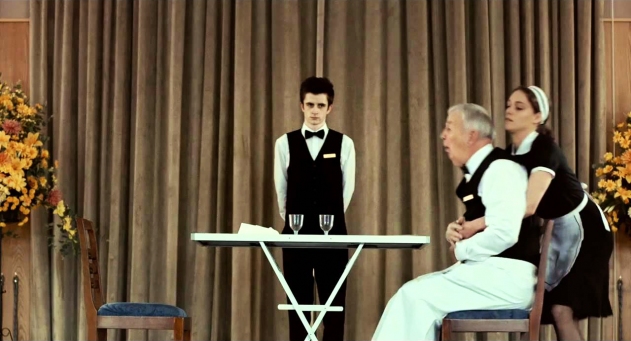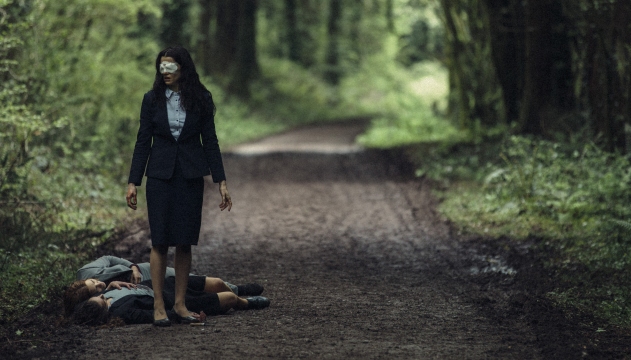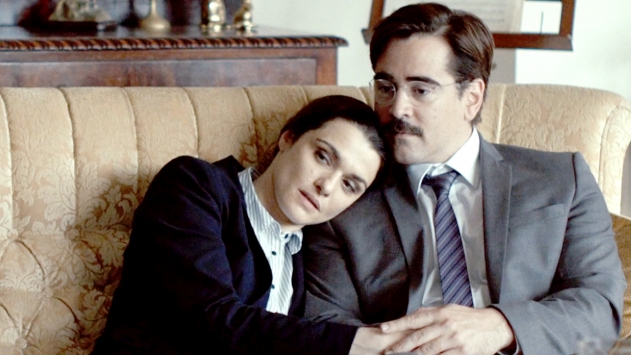
Does everyone have a perfect match? It is illegal to be single in Yorgos Lanthimos’s Cannes-winning feature film, THE LOBSTER. A hotel for eligible people gives such a person 45 days to find a partner, or else. An outcast clan of single people, the Loners, live in the woods wearing garbage bags and dancing to electronic music, which is easy to dance to alone. Those who fail to find a partner at the hotel are turned into an animal. Colin Farrell stars as a man whose wife has died, who checks into the hotel with his brother, a dog. Rachel Weisz co-stars as a Loner who becomes the object of Farrell’s love.
Neuroscientist Lucy Brown studies the brain in love. She is co-founder of the website project, “The Anatomy of Love,” with biological anthropologist Helen Fisher, who consulted on the algorithm for the online dating site Match.com. Brown recently starred in a BBC Documentary called HOW TO FIND LOVE ONLINE. In a society replete with these dating technologies, what is the best way to find a partner? Beautiful and creepy, THE LOBSTER is a commentary on our culture’s obsession with matchmaking. Science & Film spoke on the phone with Dr. Brown about the film.
Science & Film: You wrote to me that THE LOBSTER was “ranting against all natural drives, parents, society and literature.”
Lucy Brown: When it starts out there is a horrible surprise and a woman gets out of her car and shoots an animal, a donkey. And, you’re just like, huh? I was ready to stop watching right then. But, in retrospect, it’s very clever. You realize that she is probably shooting an old lover. It’s as if [the director] is saying, I’m mad at you too, establishment entertainment.
Our research says that romance and pairing up is a survival system—part of our evolution. It is a natural drive, romantic love is a natural addiction, and we need to be addicted to people for our own protection. In the movie, this idea is taken so seriously that society has adopted pairing up and marriage as law. Even people who have been heartbroken, they need special training to get back into the flow and forget the bad things so that they can pair up again. In the beginning, one of the funniest moments for me was when the heartbroken hero arrives at the hotel and they immobilize one of his hands, so that he can think about how important it is to have two of everything. Being in a couple is protection for the individual, not just procreation of the species. There is this old saying: two can live as cheaply as one. Someone helps you. Current research emphasizes the fact that people with partners even live longer and are healthier. But, this can be taken to extremes obviously. Yorgos Lanthimos is questioning if we are just going too far with this emphasis. In the movie, as part of the training for people to find a partner, there is a person on stage eating alone and he chokes to death. In the next scene, there is a person eating at the same table with a partner across from him. He starts choking, and the partner goes over and saves him from choking to death. So, the director has all of the modern research and modern ideas in this movie. It is a good satire.

S&F: So the film honors the research, and the director just takes it very literally?
LB: Very literally. Certainly we all know people do live alone and therapists say it’s better for you to live alone for a while before you live with somebody else. But, the movie says people who live alone can be just as unhappy as those who are being trained for marriage, and certainly just as cruel. The Loners are incredibly cruel to couples in some scenes. Aggression is a big thing in this movie, which is another natural drive.
I saw these Loners and how bad they were, and it made me think of my current research. I have been doing some reading on oxytocin because we are writing a new paper on oxytocin and attachment. Oxytocin is known as the cuddle hormone which makes us want to stay with someone, but when it’s given to people who are anxious about relationships it has the opposite effect and they totally withdraw. It is so easy to give oxytocin these days—you can just sniff it up your nostril; you can put some on your neck and maybe someone will then trust you more.
S&F: Are people really using oxytocin on themselves?
LB: People are doing it, yes. I think more people would be doing it except it also makes you gain weight. This is the hormone that is making the neural circuits fire in the mother’s attachment to the child, but it turns out it’s firing all the time in adult romantic attachments also.

S&F: So in the movie, the Loners are the people anxious about relationships?
LB: Right. Seeing others flirt makes them aggressive. They become aggressive to protect themselves from any closeness.
S&F: Is it true that opposites attract, and how important is it that people be alike?
LB: In some cases, opposites attract, and in some cases people who are the same are going to be compatible. What I know best at the moment is Helen Fisher’s personality test that she put on the website chemistry.com. In that case, she classifies some people as Explorers. Two explorers are going to get along well because they’ll both be high energy and they’ll both want to travel; someone who’s a couch potato won’t want to look for novel things all the time, so you want some similarity in terms of your general daily outlook on life, and some of the things you like to do. So if you like novelty, it’s good to be with someone else who likes novelty. But, if you’re a controlling director-type, high testosterone, you need someone who is a negotiator. Two directors are not going to get along well. Two people who want to be very controlling are not going to get along. You want someone who cooperates. Someone who is a controlling type needs a cooperative type who is going to be empathetic and not so opinionated. I think what the research is saying is, we need to know more about the personality of the person. Not just about the preferences in life, though that helps, but the personality of the person.
In the BBC documentary–HOW TO FIND LOVE ONLINE–there is a guy in his mid-30s and he’s always a best man never a groom. This BBC group hires a woman who is a mathematician and they say that the first 56 people on Tinder you look at you won’t get along with, but anything after 56, you’ve got a chance. This is total statistics. It doesn’t work. So then, she comes up with a questionnaire and they recruit 100 people to go through her 400 question list to see what their likes and dislikes are, and to try to come up with the right algorithm for compatibility. They then have a party and bring everyone together. One couple finds each other. Then, when they tell the people at the party who they matched them up with, it doesn’t really work. So out of 100 people there was one couple for whom it really worked, and that’s about the right percentage actually. People understood why they had been matched up the way they had, but the chemistry wasn’t there.
S&F: What is the most successful approach you’ve seen to online dating?
LB: I just read about a new website that is starting for people who are very athletically active. It is kind of like JDate. There is a very basic thing in your life that you take for granted you’re both going to share, like religion or sports. That may turn out to be one of the more successful approaches.
These websites have made us as a society kind of obsessed with trying to figure this out. Maybe it has gone a little too far. All of our societies have always been obsessed with trying to find the right person to hook up with, it’s just that at the moment we seem to be obsessed with how to do that in the best way: how to find a match. I think probably everyone who owns a computer in the world knows there is a website called Match.com. This is a very difficult question to answer. The question of why do we fall in love, or why should we pair up, that’s an easy question to answer by comparison. Who do we fall in love with and why do we fall in love with that person, that’s really hard, and I don’t think it’s going to be answered in my lifetime.
S&F: How did you get interested in this field?
LB: I have a fascination with the brain and behavior. For a long time, I had been doing some basic research about how the brain controls movement and the reward system in the brain. About the time when we were really able to look inside human brains when they weren’t anesthetized I met Helen Fisher. She was saying, if we could do some brain scanning of people in love, what part of the brain do you think would be active? I realized oh, it would be the reward system. People at the National Institute of Health were studying drug addiction and were seeing this reward system in the human brain, but always active because of drugs. I said, I would love to see the natural high. Romantic love is a state of natural euphoria. It took a while, but Helen was great. She got the data and got a psychologist Arthur Aron and he knew things about the Passionate Love Scale, and so it was a terrific collaboration. It was all stuff I had to do at night or on weekends, but as soon as I saw that the results of the studies looking at people in the early stages of romantic love showed it was not just one of the more elaborate reward parts of the brain, it was the most basic primitive part of the brain, the origin of the reward system, where everybody showed an activation. People were different in the cognitive parts of the brain, but where everyone was the same was this basic drive area. It’s not just human, but a mammalian reward system.
S&F: Does the activation of this reward system change when people get older?
LB: Not at all. What can change is that some people are kind of afraid to fall in love. They are anxious their whole lives and as they get older, they relax. I know people who fell in love for the first time at age 70. People fall in love in their 90s. Falling in love is always the same. The important thing is that you can learn about yourself when you fall in love, about your reactions to other people. What I have taken away from my research is the question that the movie comes up with, how are we going to find a match. For me, it’s the question, how am I as a person going to learn to get along with someone because, no matter what, the romance for almost everybody begins to fade away. It’s very important to remember that romance, but what you have to do is learn to be a good partner. You have to learn to be a supportive partner. You have to learn to enjoy life yourself.
We studied some people who say that after even 20 years of marriage they are still madly in love, and that it’s the same as it was the first six months. The psychologists who were studying this thought these people were lying. With function MRI imaging we had a chance to see. And indeed, when they looked at the person they had been married to for 20 years, that primitive brain area lit up just like young love. For some people, it can be there. I remember a reporter once wanted to go meet some of those people and ask, how are they different? Of course, there was nothing special about their relationships, it was the people themselves. They were positive people. There has to be some level of compatibility as I said, but once you have that, if you have two people who basically have a positive outlook on life, or even one person who enjoys things tremendously so their reward system is primed, they were lucky, their reward system makes a lot of things in their life good and makes them just generally happier than the rest of us.

S&F: Is it possible to find a perfect match?
LB: No. There is no perfect match. Mostly, it’s a learning process for everybody involved to enjoy the other person, to enjoy life, not to criticize. Now, there is a ton of stuff out there to learn about how to interact with a partner you’re living with: not to be hyper critical and to be sure that you enjoy the accomplishments of the other person. If they get a promotion, to go out and celebrate with them, don’t just say, oh that’s nice. Some people, it just comes naturally or their parents taught it to them, but others need to learn and it’s something that’s learnable. One thing this movie does say is how dangerous love is. Love can be dangerous—we study heartbreak also. The movie brings that home, how horrible heartbreak can be. But, again, it looks as if we all have to go through it. It is part of life; we were born with this capacity.
THE LOBSTER, directed by Yorgos Lanthimos, is now in theatres.
Dr. Lucy Brown is a clinical professor in the Department of Neurology and a professor of neuroscience at the Albert Einstein College of Medicine in the Bronx. She was Director of the Laboratory for Functional Neuroanatomy and Movement Disorders for over twenty years. Together with Art Aron and Helen Fisher she pioneered studies of the neuroscience of romantic love. Currently, she collaborates with several investigators on brain imaging of love, personality traits, mobility, and cognition in normal aging.